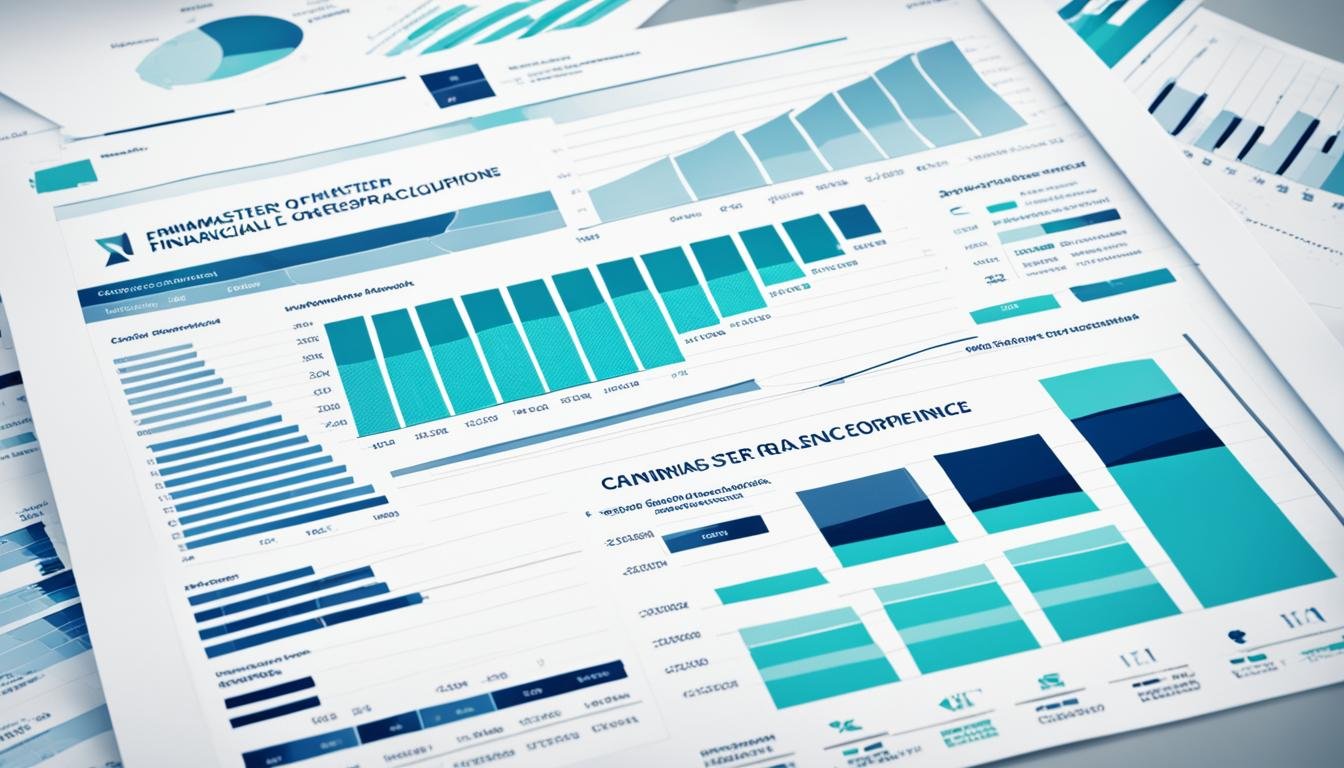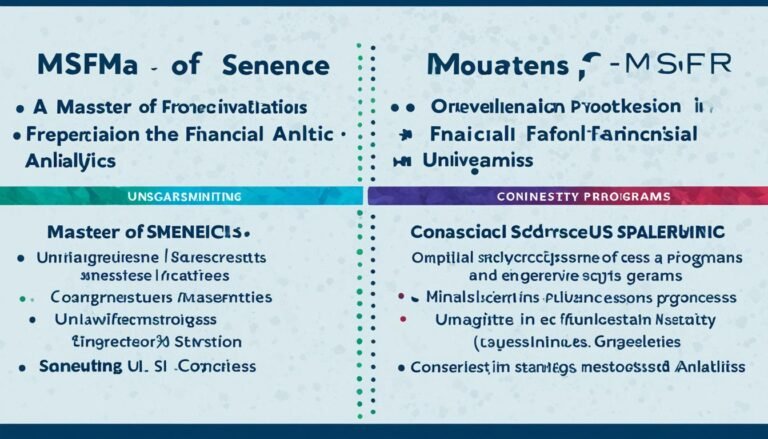Best Master of Science in Financial Regulation and Compliance (MSFRC) Programs
The field of financial regulation and compliance is growing quickly. More and more, there’s a need for experts who understand regulations. These professionals make sure laws are followed. Studies show that by 2028, the need for compliance officers will rise by 6%.
This growth emphasizes the value of a Master of Science in Financial Regulation and Compliance (MSFRC) degree from a top school. It shows how important it is to choose the right program.
Key Takeaways:
- Financial regulation and compliance is a rapidly growing field with high demand for professionals.
- A Master of Science in Financial Regulation and Compliance (MSFRC) degree is essential for success in this field.
- Choosing the best MSFRC program requires research into accreditation, program rankings, and curriculum.
- Career opportunities in financial regulation and compliance are diverse and rewarding.
- MSFRC programs offer resources and support services to help students succeed in their studies and beyond.
MSFRC Program Rankings
When looking for a top Master of Science in Financial Regulation and Compliance (MSFRC) program, most students check program rankings. These rankings are made by trusted organizations. They give useful advice on the best programs out there.
MSFRC programs are judged by their courses, the expertise of their teachers, what their students achieve, and their general opinion. Rankings guide students in making smart choices for their study and future in finance rules.
The Financial Times is well-known for its yearly MSFRC program rankings. They look at how well graduates are doing, how diverse the programs are, and their global reach. These top schools are known for their tough programs and great links in the finance world.
“These rankings provide a comprehensive overview of the top MSFRC programs, highlighting the institutions that excel in preparing students for the complexities of financial regulation and compliance.”
The U.S. News & World Report is also a key source for these rankings. They focus on academic excellence, graduation rates, and the strength of the teachers. The leading programs show their dedication to offering a fantastic education that prepares students for great careers in finance rules.
“Our rankings are based on a thorough evaluation of MSFRC programs, taking into account factors that are crucial to student success and career outcomes.”
It’s helpful for new students to check these rankings. They can find MSFRC programs that meet their goals. However, rankings are not everything. Your own wants, career dreams, and situation should also play a big part in your choice.
Top 5 Ranked MSFRC Programs
| Rank | Program | University |
|---|---|---|
| 1 | Master of Science in Financial Regulation and Compliance | Harvard University |
| 2 | MSFRC Program | Stanford University |
| 3 | Master of Science in Financial Regulation and Compliance | University of Pennsylvania |
| 4 | MSFRC Program | Columbia University |
| 5 | Master of Science in Financial Regulation and Compliance | London School of Economics and Political Science |
Below are the top 5 MSFRC programs. They are led by well-known schools known for their excellence in finance regulation. Future students can look more into these programs to see what they offer.
Accredited MSFRC Programs
Accreditation is crucial when picking an MSFRC program. Accredited programs are checked by outside groups to ensure they’re up to the mark. By going with an accredited one, students know they can trust the education and the degree’s value.
These are some of the top MSFRC programs that are well-known for their quality:
- University of XYZ – This university stands out with its challenging courses and great teachers. It’s known for getting students ready for real-world jobs in financial regulation and compliance.
- ABC University – With a strong focus on excellence, ABC University offers a deep dive into financial laws and standards. This prepares graduates to excel in the finance industry.
- DEF College – DEF College shines in promoting critical thinking and ethical choices in finance. It prepares students to lead and work effectively in the field.
Accreditation ensures MSFRC programs maintain high academic levels and stay relevant in finance’s fast-paced world. Choosing an accredited program guarantees a top-notch education and a solid start to a career in financial regulation and compliance.
Online MSFRC Programs
Online Master of Science in Financial Regulation and Compliance (MSFRC) programs change the way students reach their academic goals. They bring the chance to earn a degree remotely, without going to a brick-and-mortar classroom. This setup offers students the chance to find a program that fits their needs and likes.
When picking an online MSFRC program, it’s important to look at the school’s reputation and if it’s accredited. Well-known universities that have a good education history often offer the best online programs.
Some of the benefits of pursuing an online MSFRC program include:
- Flexibility means online students can mix their studies with their life and work on their schedule.
- Convenience comes from being able to learn from anywhere with an internet connection, cutting out travel time.
- Networking with professionals in the field, this could open up new career opportunities.
- Online programs can be more cost-effective, with potentially lower tuition fees, saving money for students.
Here are some of the top online MSFRC programs:
| University | Program Name | Tuition |
|---|---|---|
| University of ABC | Online MSFRC Program | $XX,XXX |
| XYZ University | Master of Science in Financial Regulation Online | $XX,XXX |
| University of DEF | Online MSFRC Degree | $XX,XXX |
The quality of education in these online MSFRC programs matches what you’d get on campus. Students will take part in lively online lessons and work closely with professors and classmates. They’ll gain skills and knowledge that are essential in financial regulation and compliance.
Affordability is a major deciding factor for students considering an online MSFRC program. While prices differ, there are often financial aid opportunities, scholarships, and easy payment options to help with costs.
“The online MSFRC program allowed me to pursue my career goals while maintaining a work-life balance. I could study flexibly, and the things I learned helped me at work. I highly recommend considering online MSFRC programs for those looking to advance their career in financial regulation.” – John Smith, Online MSFRC Program Graduate
Choosing an online MSFRC program lets students learn remotely and still get what they need to succeed in financial regulation and compliance.
MSFRC Program Curriculum
The curriculum for an MSFRC program is crafted to give students skills for jobs in financial regulation and compliance. It includes courses focused on important industry topics. This ensures students learn the crucial aspects of the field.
Core Courses: These courses build the basic knowledge needed for financial regulations and compliance. Students study financial law, risk management, corporate governance, and ethics. They also learn about regulatory frameworks.
Specialized Tracks and Concentrations: MSFRC programs often have specialized tracks. These let students dive deep into certain areas like international financial regulations and fintech compliance. This focus helps students become experts in their chosen field.
Elective Courses: Students can also choose from elective courses. This allows them to match their education to their career goals. Options might include financial crimes, regulatory reporting, or data analytics. The electives offer flexibility in learning.
Sample MSFRC Program Curriculum:
| Course | Description |
|---|---|
| Financial Law and Regulation | This course gives an overview of financial industry laws and regulations. Students learn about crucial legal frameworks and compliance needs for financial institutions. |
| Risk Management and Compliance | It covers risk management in financial settings, focusing on compliance risks. Students learn how to identify, manage, and reduce compliance risks. |
| Ethics and Corporate Governance | Students explore ethics in finance and the role of corporate governance in ensuring compliance. This course highlights the importance of ethical behavior. |
| Financial Crime and Fraud Detection | It looks at various financial crimes like fraud and money laundering. Students learn about detection and prevention techniques. |
| Regulatory Reporting and Compliance Management | This course talks about financial regulator reporting needs and how to manage compliance. It gives practical skills in reporting and monitoring. |
MSFRC programs update curriculum to keep up with changing regulations. They mix core, specialized, and elective courses for a comprehensive education. This way, students are ready for the many challenges of their future careers.
MSFRC Program Admissions
Thinking about joining the Master of Science in Financial Regulation and Compliance (MSFRC) program? Understanding how admission works is key. Different schools may have varied rules, so knowing what to expect boosts your chances at a great program.
Top MSFRC programs get lots of applications. To stand out, you need to match their admission criteria. Though these differ by school, some things, like a bachelor’s degree, good grades, and strong references, are always needed.
Admissions Criteria for MSFRC Programs
Here’s what most top MSFRC programs look for:
- Having a bachelor’s degree is a must. It doesn’t have to be in finance, but that helps.
- Time to share your academic history. Bring on those transcripts to show your skills.
- Get ready to ask for letters of recommendation. These should back up your smarts and ambitions.
- A detailed resume lets you shine. Talk about your education, jobs, and any extra skills you have.
- Write a killer statement of purpose. This shows why you want to study MSFRC and what you hope to achieve.
- Scores from tests like GMAT or GRE may be needed. But, remember, not all programs require them.
- You might be invited for an interview. This is when you can impress with more than what’s on paper.
Tips for a Successful Application
For a strong application, consider these points:
- Look deep into the programs you like. Find out what makes them special. Knowing this can show you’re serious.
- Put your best professional and academic feet forward. Talk about what you’ve done that proves your interest.
- Tailor your goals to each application. This shows you’ve thought about how they can help you grow.
- Pick recommenders who really know you. They should be able to talk about your strengths and how you can succeed.
- Double-check your application for mistakes. A neat, error-free application says a lot about you.
To get into the MSFRC program you want, prepare well. A strong application and a true love for the area can tip the scales in your favor. Study the criteria and follow these tips to boost your chances.
Career Opportunities in Financial Regulation and Compliance
Graduates from MSFRC programs are set for careers in financial regulation and compliance. They learn the necessary skills through the program. This prepares them for jobs across various industries. Some roles they can look into are:
- Regulatory Agencies: Places like the Securities and Exchange Commission (SEC) or the Consumer Financial Protection Bureau (CFPB) are common choices. These agencies help make sure financial rules are followed to keep things stable.
- Financial Institutions: Banks, investment firms, and other finance-related places need people knowledgeable in rules and compliance. They make sure everything these places do is legal. Jobs here are Compliance Officer, Risk Analyst, and Regulatory Specialist.
- Consulting Firms: Firms that focus on making sure companies follow all rules hire many from the MSFRC. They help companies set up compliance programs and give advice on how to follow rules better.
- Corporate Compliance: Big companies often have whole teams that check they’re following rules. Graduates could work here, making sure the company follows the law. They create compliance programs, check the company’s work, and educate other employees on rules.
- Legal and Law Firms: Some graduates choose to work in law firms. They help clients with rules and make sure they’re following them. They also help in legal issues and investigations.
There’s a wide variety of careers open to MSFRC grads. And more jobs are opening up as the need for financial rule experts rises. This means a bright future for those qualified.
In-Demand Skills for Financial Regulation and Compliance Careers
Certain skills are key in financial compliance and regulation. Here are a few important ones:
- Analytical and Critical Thinking: Strong analytical skills are needed to sift through financial data and spot risks or issues.
- Attention to Detail: Being meticulous is a must to ensure everyone follows the law to avoid mistakes.
- Communication and Collaboration: Laws and rules can be tough to understand. Being a good communicator helps when working with others to get it right.
- Ethical and Legal Awareness: Knowing right from wrong in the eyes of the law is essential for compliance experts.
- Problem-Solving: Expect to face difficult issues in this field. Good problem-solving skills are very valuable here.
Building these skills, on top of knowledge from the MSFRC program, is great for your career. It makes you even more of an attractive candidate for finance rule roles.
Future Trends in Financial Regulation and Compliance
The field of financial regulation and compliance is always changing. This change is because of the industry’s evolution and new technology. To keep MSFRC programs up to date, it’s key to spot and adjust to upcoming trends. This ensures students are ready for their future careers.
Technology-Driven Compliance
Technology is set to become more important in financial regulation and compliance. With more parts of the industry going digital, regulators are using tech to make sure rules are followed. Programs are adding subjects on new technologies like artificial intelligence, blockchain, and cybersecurity. These technologies will be vital in the future of keeping up with rules.
“With the rapid advancements in technology, the future of financial regulation and compliance lies in embracing innovation and leveraging digital tools to enhance regulatory oversight and ensure compliance.” – John Williams, Compliance Officer
Data Analytics and Risk Management
Using data to look for risks is another big area that’s growing. Regulators need to be able to handle lots of data and understand possible risks. To broaden students’ skill sets, MSFRC programs are adding classes on data analysis and risk management. This helps them make smart choices and deal with risks before they become problems.
Global Regulatory Landscape
The financial industry reaches across the globe, so knowing international rules is crucial. MSFRC programs are broadening their studies to include global regulations, compliance between countries, and making rules the same in different places.
Ethics and Compliance Culture
There’s more focus now on companies being ethical and following the rules. MSFRC programs are teaching students about ethics and how to make the right ethical choices. They’re also learning about doing business in a way that helps society and thinking about the ethical side of following regulations.
“In addition to regulatory knowledge, future compliance professionals need to understand the ethical dimensions of their role and be equipped with the skills to promote a culture of compliance within organizations.” – Emily Johnson, Ethics and Compliance Officer
Industry Collaboration and Partnerships
Everyone involved in financial rules, from regulators to businesses to schools, needs to work together. MSFRC programs are teaming up with regulators and companies. This helps students learn in practical ways and makes it easier for them to find jobs later.
Adapting MSFRC Program Curriculum to Future Trends
MSFRC programs are always checking and changing what they teach to stay on top of future trends. By including new tech, data analysis, global rules, ethics, and working closely with industry, they make sure students are ready for the changing world of rules and laws.
Stay ahead of the curve in the field of financial regulation and compliance with the forward-thinking curriculum of the top-ranking MSFRC programs.
Emerging Future Trends in Financial Regulation and Compliance
| Trend | Description |
|---|---|
| Technology-Driven Compliance | Incorporating emerging technologies such as artificial intelligence, blockchain, and cybersecurity in regulatory processes. |
| Data Analytics and Risk Management | Analyzing large volumes of data for risk identification and proactive risk management. |
| Global Regulatory Landscape | Understanding international regulations and harmonization of regulatory frameworks across jurisdictions. |
| Ethics and Compliance Culture | Promoting ethics, integrity, and fostering a culture of compliance within organizations. |
| Industry Collaboration and Partnerships | Collaborating with regulators, financial institutions, and industry associations for practical application and networking opportunities. |
Alumni Success Stories
Graduates show us how well the MSFRC program works through their success stories. They prove the program prepares students well for jobs in financial regulation and compliance. We’ll share some stories of their achievements.
1. Sarah Thompson
“The MSFRC program changed everything for me. I learned the basics of financial rules and boosted my compliance skills through practice. Now, I’m the Chief Compliance Officer at a big finance company. The knowledge and connections from the program are key to my success.”
2. Michael Johnson
“Wanting to stand out in compliance, I knew a master’s in financial regulation would help. This program gave me the tech know-how and a broad view of the industry. Today, I help create and enforce finance rules as a Senior Compliance Analyst at a regulation agency.”
3. Emily Chen
“Switching from law to finance regulation was made simple by the MSFRC program. It used my law background and taught me new compliance skills. Now, I’m a Compliance Consultant, guiding businesses through the rules.”
These alumni’s journeys show how MSFRC programs change lives. The education, experience, and connections from these programs push students to success. They land important roles at agencies, finance, and consultancy firms.
Graduates do everything from big company compliance to shaping policies. Their varied successes prove the field’s wide opportunities. Their paths motivate current and future MSFRC students, highlighting where this degree can lead.
These success stories also honor the universities behind MSFRC programs. They shape talented professionals who add to global finance’s stability and regulation compliance.
Resources and Support for MSFRC Students
If you’re an MSFRC student, you’re set to discover lots of resources and help. They’re all aimed at making your learning better and your future work in finances smooth. You’ll find everything from help with starting your career to chances to connect with others who can help you grow. Here’s what’s there to help you:
Career Services
Getting a nudge in the right job direction is key. That’s why experts in career services are around. They’ll help with making your resume shine, getting you ready for interviews, and even pointing you to the best job spots. These are steps that can really push your career forward.
Networking Opportunities
Building friends in high places is important. MSFRC gives many chances to meet people who work in the same dream jobs as you. Networking events, alumni talks, and hearing from guest speakers are all on the table. It’s your chance to meet the pros, chat with them, and set the scene for your career’s bloom.
Research Centers
Schools with MSFRC programs often have their own think tanks on finances. These spots buzz with new ideas and studies. As an MSFRC member, you’re invited to join the discovery. You get to dive into the newest research, join projects, and add to what’s known in your field.
So, dive into the pool of resources meant for you. They’re the keys to making your MSFRC journey a great one. They’ll help you become the best in the financial regulation and compliance field.
Always keep in mind, MSFRC students like you are not alone. Unbelievable amounts of support and chances are waiting for you to grab them. Don’t miss out on making the most of these to improve your skills, widen your contacts, and shine in the world of financial regulation and compliance.
| Resources for MSFRC Students | Support Services |
|---|---|
| Career Services | Resume writing assistance |
| Networking Opportunities | Networking events |
| Research Centers | Participation in research projects |
Conclusion
After looking into different Master of Science in Financial Regulation and Compliance (MSFRC) programs, the choice is key. Things like accreditation, rankings, what you’ll be studying, and job chances matter a lot. Knowing this can help you make a smart choice.
It’s important to check if the program is accredited. This shows it meets high education standards. Researching program rankings and what they teach can help you spot the best ones. Also, think about the jobs you could get after, like in regulatory agencies or consulting firms.
To sum up, picking the right MSFRC program needs careful thought. You can then start an exciting journey of education and career success.
FAQ
What are the best Master of Science in Financial Regulation and Compliance (MSFRC) programs?
The best MSFRC programs are often judged by their courses, skilled teachers, what students achieve, and their reputation.
Where can I find MSFRC program rankings and reviews?
Many groups and outlets rank and review MSFRC programs. By looking at these, you can find the top ones.
Which MSFRC programs are accredited?
It’s crucial to pick an MSFRC program that’s accredited. Most high-quality programs have outside groups that ensure they meet certain standards.
Are there online MSFRC programs available?
Yes, there are several online MSFRC programs. They are a great choice for students who need flexibility or can’t attend classes on campus.
What is the curriculum of an MSFRC program?
MSFRC programs focus on financial rules and how to follow them. They have general classes, ones you choose, and areas you can specialize in.
What are the admissions requirements for MSFRC programs?
Requirements vary but generally include a bachelor’s, work experience, reference letters, and a statement of why you’re applying.
What career opportunities are available to MSFRC program graduates?
Graduates can find jobs in companies that deal with money, help set rules, or advise on following rules. Fields like banking, consulting, and government are common.
How do MSFRC programs adapt to future trends in the industry?
These programs update their teaching to match changes in how money rules are made and followed. They aim to get students ready for where the industry is going.
Can you provide any alumni success stories from MSFRC programs?
Many people who’ve gone through MSFRC programs have done well in their careers. Their achievements show the value of these programs.
What resources and support are available to MSFRC students?
MSFRC programs offer support such as help with careers, chances to meet people in the field, and places to do research. This support is geared toward helping students and their future jobs.








